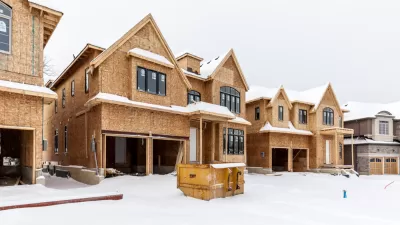Recent trends in declining car ownership, along with the Millennial generation’s widely-reported abhorrence for driving, have some wondering if the era of car dominance is over. But what if the decline just comes down to trouble paying the bills?

The numbers don’t lie: Americans drive less and own fewer cars. The trend is led by Millennials, which, according to some theories, are making their decisions about car ownership based on a less materialistic set of priorities than previous generations.
Jeremy Cato, however, reports on several sources of data that suggest the explanation might be much simpler than that. For example, data from the Highway Loss Data Institute “suggests that [the drop in young drivers] has coincided with the economic downturn – which has not only hammered youth employment, but also has had an impact on parents who might otherwise help their kids take the wheel.” The data also suggests that kids are still “keen” to get cars, and they do so as soon as they can afford it.
Another article by James R. Healey, discussing the decline in household car ownership, shares a similar point about the effect of the economy on car ownership: “Other analysts agree there's a slump in vehicle ownership, but are less likely to see as an anti-car shift in social mores or demographics that to see it as the fallout from the Great Recession.” Healey also quotes data from Edmunds.com that indicates Millennials will quickly buy cars once they get jobs and form households.
FULL STORY: The real reason millennials don't drive or buy cars

Planetizen Federal Action Tracker
A weekly monitor of how Trump’s orders and actions are impacting planners and planning in America.

Map: Where Senate Republicans Want to Sell Your Public Lands
For public land advocates, the Senate Republicans’ proposal to sell millions of acres of public land in the West is “the biggest fight of their careers.”

Restaurant Patios Were a Pandemic Win — Why Were They so Hard to Keep?
Social distancing requirements and changes in travel patterns prompted cities to pilot new uses for street and sidewalk space. Then it got complicated.

Platform Pilsner: Vancouver Transit Agency Releases... a Beer?
TransLink will receive a portion of every sale of the four-pack.

Toronto Weighs Cheaper Transit, Parking Hikes for Major Events
Special event rates would take effect during large festivals, sports games and concerts to ‘discourage driving, manage congestion and free up space for transit.”

Berlin to Consider Car-Free Zone Larger Than Manhattan
The area bound by the 22-mile Ringbahn would still allow 12 uses of a private automobile per year per person, and several other exemptions.
Urban Design for Planners 1: Software Tools
This six-course series explores essential urban design concepts using open source software and equips planners with the tools they need to participate fully in the urban design process.
Planning for Universal Design
Learn the tools for implementing Universal Design in planning regulations.
Heyer Gruel & Associates PA
JM Goldson LLC
Custer County Colorado
City of Camden Redevelopment Agency
City of Astoria
Transportation Research & Education Center (TREC) at Portland State University
Camden Redevelopment Agency
City of Claremont
Municipality of Princeton (NJ)




























